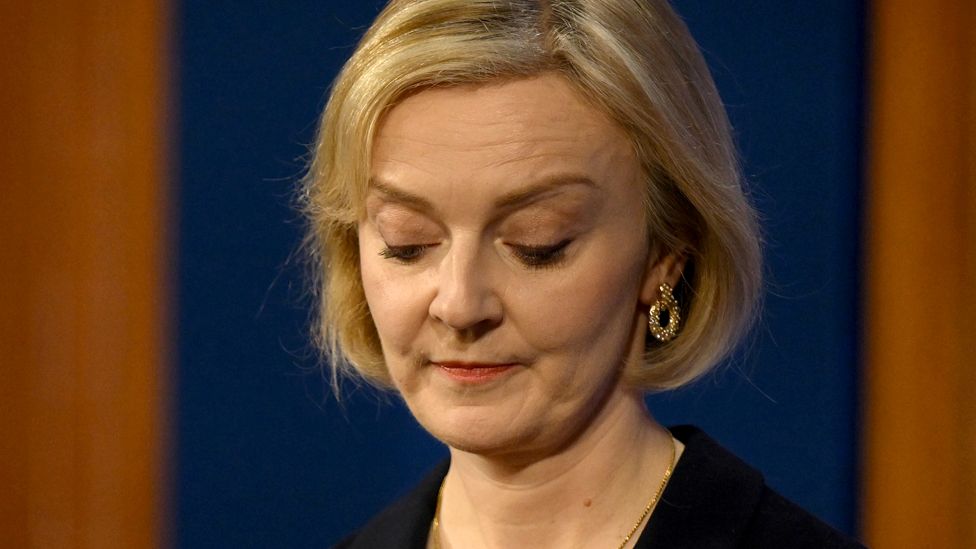Triple lock: Liz Truss won't commit to raising pensions with inflation
- Published
- comments

Liz Truss is no longer promising to increase state pensions in line with surging inflation, as she asks ministers to look for spending cuts.
Two weeks ago the PM said she was "committed" to the triple lock, so payments rise by whatever is higher: prices, average earnings or 2.5%.
But her spokesman has now said she was "not making any commitments" on government spending.
It comes after ditching flagship tax cuts announced in the mini-budget.
Chancellor Jeremy Hunt's move to tear up most of last month's mini-budget announcements has reassured investors, but left Ms Truss battling to salvage her authority.
A decision on what to do with pensions from next April has not yet been made, and would normally be expected this autumn.
However, the PM's spokesman said she was still committed to her pledge of raising defence spending to 3% of national income by 2030.
The triple lock has been in place ever since it was introduced under the Conservative/Liberal Democrat coalition, apart from a one-year suspension due to Covid.
The government moved to suspend the commitment in 2021 after an unusually large rise in the average earnings figure during the pandemic.
Both the Conservatives and Labour promised to maintain the triple lock in their 2019 general election manifestos.
The PM's spokesman said she was aware of "how many vulnerable pensioners there are," and protecting the vulnerable was a "priority".
The spokesman said moving away from the previous triple lock commitment was a "mutual decision" by the PM and the chancellor, and it was their "agreed position" to prioritise economic stability.
Inflation in the year to September was at 10.1%, according to the latest figures from the Office for National Statistics, which were released on Wednesday. The figure for average earnings is 5.4%.
The Resolution Foundation think tank has estimated, external raising pensions by earnings instead of inflation would save the government £6bn next year.
Ms Truss is also facing pressure from some of her MPs to raise working-age benefits in line with inflation, with the issue dominating the recent Tory party conference in Birmingham.
Liz Truss sat in the Commons on Monday as Mr Hunt outlined the tax U-turns to MPs
Former minister Steve Double and fellow Tory backbencher Maria Caulfield have said they would not support an end to the triple-lock for pensions.
He replied to a tweet from Ms Caulfield, in which she said she would not back such a move in the Commons, with the caption: "Nor me."
Labour's shadow work and pensions secretary Jonathan Ashworth said the government's "disastrous budget" meant it was "considering further cuts to pensioners' incomes".
"Pensioners deserve so much better than Liz Truss and her disastrous mistakes that are leaving older people paying the price," he added.
Liberal Democrat spokesperson for work and pensions Wendy Chamberlain said it would be a "kick in the teeth for millions of people" if the triple lock is not maintained.
Former pensions minister and Conservative peer Baroness Ros Altmann told BBC Radio 4's Today Programme that the immediate help given to pensioners "should not be up for discussion", adding that it would be "unforgivable" if the government rowed back on its promise to protect the triple lock.
"We have to be careful that we don't just try and short-change the elderly two years in a row in the middle of a cost of living crisis," she said.
"These frail, elderly people who have paid national insurance for decades on the understanding that they would at least get some basic state pension in their retirement must not be abandoned just because we have a short-term problem."
The government's latest comments on pensions come after ministers were told to draw up spending cuts ahead of a further economic statement form Mr Hunt at the end of this month.
On Monday, Mr Hunt told MPs "decisions of eye-watering difficulty" on tax and spending would have to be taken, as the government tries to restore economic stability.
The chancellor - appointed after Ms Truss made her previous commitment on pensions - told them he was "not making any commitments on any individual policy areas".
No 10 said the chancellor had asked them to "focus" on areas that would not affect the service the public receives.
However, all departments, including the Ministry of Defence, have been asked to find savings for the taxpayer.
Allies of Defence Secretary Ben Wallace say he considers maintaining the 2030 defence spending target a red line. A source told the BBC Mr Wallace would "hold the PM to the pledges made".
Related Topics
- Published2 September 2022